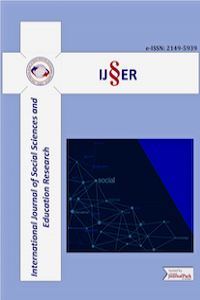Covid-19 pandemi sürecinde uzaktan eğitimin twitter yansımalarının duygu analizi
Uzaktan eğitim, Sentiment analiz, Twitter, Covid-19, BERT modeli
Sentiment analysis of twitter reflections of distance education in the covid-19 pandemic process
Distance education, Sentiment analysis, Twitter, Covid-19, BERT model,
___
- Aksoğan, M., & Duman, Ç.M., (2020). A research on academician opinions on distance education in the COVID-19 Process.NATURENGS, MTU Journal of Engineering and Natural Sciences, Special Issue,38-49. doı: 10.46572/nat.2020.10
- Arat, T., ve Bakan, Ö. (2011). Uzaktan eğitim ve uygulamaları. Selçuk Üniversitesi Sosyal Bilimler Meslek Yüksek Okulu Der¬gisi, 365, 14(1-2).
- Basalaia, G., ve Kvavadze, D. (2020). Transition to online education in schools during a SARS-Cov-2 Coronavirus (COVID-19) pandemic in Georgia. Pedagogical Research, 5(4), 1-9.
- Bozkurt, A.,ve Sharma, R. C. (2020). Emergency remote teaching in a time of global crisis due to Corona virus pandemic. Asian Journal of Distance Education, 15(1), i-vi. doi:10.5281/zenodo.3778083
- Carter, R. (2004). Language and creativity; the art of common talk. London: Routledge.
- Corcuera, L.C., ve Alvarez, A.V. (2021). Teacher's roadblocks in the time of quarantine teaching. International Journal of Social Sciences and Education Research, 7 (4), 427-434. doı: https://doi.org/10.24289/ijsser.1003162
- D’Agostino M. (2020). Analysis of social media data about COVID-19 in the Americas, WHO. (2020) https://www.who.int/docs/default-source/epi-win/presentations-of-all-speeches/webinar-18-sgs-ib-8-april-2020.pdf?sfvrsn=db304bde_2
- Danjou, P. E. (2020). Distance teaching of organic chemistry tutorials during the COVID-19 pandemic: Focus on the Use of videos and social media. Journal of Chemical Education, A-D. doi:10.1021/acs.jchemed.0c00485
- Demirtas, E., ve Pechenizkiy, M. (2013). Cross-Lingual polarity detection with machine translation. In proceedings of the second ınternational workshop on ıssues of sentiment discovery and opinion mining (WISDOM ’13)
- Devlin, J., Chang, M.W., Lee K., ve Toutanova, K. (2019). BERT: Pre-training of deep bidirectional transformers for language understanding https://huggingface.co/savasy/bert-base-turkish-sentiment-cased
- Gottlieb, M., ve Dyer, S. (2020). Information and disinformation: social media in the COVID-19 crisis. Academic Emergency Medicine, 27, 640-641.
- Gupta, A. ve Coven, J. (2020) Disparities in mobility responses to COVID-19 https://static1.squarespace.com/static/56086d00e4b0fb7874bc2d42/t/5ebf201183c6f016ca3abd91/1589583893816/DemographicCovid.pdf
- Guragai, M. (2020). Nepalese medical students in the COVID-19 pandemic: Ways forward, Journal of the Nepal Medical Association, 58(225), 352-354.
- Hayran, A., & Sert, M. (2017). Sentiment analysis on microblog data based on word embedding and fusion techniques, IEEE 25th Signal Processing and Communications Applications Conference (SIU 2017), Belek, Turkey
- Hermida, A., Fletcher, F., Korell, D., ve Logan, D. (2012). Share, like, recommend. Journalism Studies, 13, 815-824.
- Ho, J., ve Tay, L. Y. (2020). Ensuring learning continues during a pandemic. International Studies in Educational Administration, 48, 49-55.
- Kamps, J. Marx, M., Mokken, R. J. ve De Rijke, M. (2004). Using wordnet to measure semantic orientations of adjectives, proceedings of the fourth ınternational conference on language resources and evaluation (LREC’04), Lisbon, Portugal 1115 - 1188 http://www.lrec-conf.org/proceedings/lrec2004/pdf/734.pdf Kar, A. K., ve Dwivedi, Y. K. (2020). Theory building with big data-driven research –moving away from the “what” towards the “why”. International Journal of Information Management, 54, 1–10. 10.1016/j.ijinfomgt.2020.102205
- Kharde, V.A. & Sonawane, S. (2016). Sentiment analysis of twitter data: A survey of techniques. International Journal of Computer Applications (0975 – 8887), 139(11), 5 – 15
- Kırık, A. M. (2014). Uzaktan eğitimin tarihsel gelişimi ve Türkiye’deki durumu. Marmara İletişim Dergisi, 73-94, 21.
- Koloğlu, T. F., Kantar, M., ve Doğan, M. (2016). Öğretim elemanlarının uzaktan eğitimde hazır bulunurluklarının önemi, AUAd, 2(1): 52-70.
- Millî Eğitim Bakanlığı. (2020a). Bakan Selçuk, koronavirüs’e karşı eğitim alanında alınan tedbirleri açıkladı. https://www.meb.gov.tr/bakan-selcuk-koronaviruse-karsi-egitimalaninda-alinan-tedbirleri-acikladi/haber/20497/tr
- Mishra, L., Gupta, T., ve Shree, A. (2020). Online teaching-learning in higher education during lockdown period of Covid-19 pandemic. International Journal of Educational Research Open, 1.
- Prensky, M. (2007). How to teach with technology: Keeping both teachers and students comfortable in an era of exponential change. Emerging Technologies for Learning, 2, 40-46.
- Sözen, N. (2020). COVID 19 sürecinde uzaktan eğitim uygulamaları üzerine bir inceleme. Avrasya Sosyal ve Ekonomi Araştırmaları Dergisi (ASEAD), 7(12), 302-319.
- Taboada, M., Brooke, J., Tofiloski, M., Voll, K.,ve Stede, M. (2011). Lexicon based methods for sentiment analysis. Computational Linguistics, 37(2), 267-307.
- Toquero, C. M. (2020). Emergency remote teaching amid COVID-19: The turning point. Asian Journal of Distance Education,15(1), 185-188. doi:10.5281/zenodo.3881748
- Ofcom. 2008. Social networking: A quantitative and qualitative research report into attitudes, behaviours and use. Office of Communications: London. Özdoğan, A. Ç., ve Berkant, H. G. (2020). COVID-19 pandemi dönemindeki uzaktan eğitime ilişkin paydaş görüşlerinin incelenmesi. Millî Eğitim, 49(1), 13-43.
- Valentine, D. (2002). Distance learning: Promises, problems, and possibilities. Online Journal of Distance Learning Administration, 5(3). 1-11 https://www.westga.edu/~distance/ojdla/fall53/valantine53.pdf
- Warschauer, M. (2004). Technology and social inclusion: Rethinking The digital divide. Cambridge, Massachusetts: The MIT Press.
- WHO (2020). Responding to community spread of COVID-19 : Interim guidance, https://www.who.int/docs/defaultsource/coronaviruse/20200307-responding-to-COVID-19 -communitytransmission-final.pdf.
- WHO (2021a). WHO Coronavirus (COVID-19) Dashboard. https:// covid19.who.int/.
- WHO. (2021b). COVID-19 Global excess mortality. Retrieved from https://www.who.int/data/stories/the-true-death-toll-of-covid-19-estimating-global-excess-mortality
- Yamamoto Telli G., ve Deniz, A. (2020). Coronavirüs ve çevrimiçi (Online) eğitimin önlenemeyen yükselişi. Journal of University Research 3(1), 25-34.
- Yip, P. S. F., ve Chau, P.H. (2020). Physical distancing and emotional closeness amidst COVID-19. Crisis, 41(3), 153-155.
- YÖK. (2020a). Üniversitelerde uygulanacak uzaktan eğitime ilişkin açıklama. https://www.yok.gov.tr/Sayfalar/Haberler/2020/
- Yayın Aralığı: Yılda 4 Sayı
- Başlangıç: 2015
- Yayıncı: Mahmut DEMİR
Non-Fungible Token’i (NFT) anlamak ve Türkçe isim önerisi
Yerel halkın kültürel miras değerlerine yönelik metaforik algılarının belirlenmesi: Mersin örneği
Cemile YÜCEL, Sevda SAHİLLİ BİRDİR
İş yaşamı kalitesinin sosyal kaytarma davranışı üzerindeki etkisi: Hemşireler üzerinde bir araştırma
Abdullah SOYSAL, Zuhal KURTOĞLU
Kevın CARATIQUIT, Lovely Jean CARATIQUIT
Covid-19 pandemi sürecinde uzaktan eğitimin twitter yansımalarının duygu analizi
Engin KANDIRAN, Burcu GUMUS, Mehmet Ali ÖZER
Turizm destinasyonlarına yönelik pahalılık algısının internet gazetelerinde temsili: Bodrum örneği
